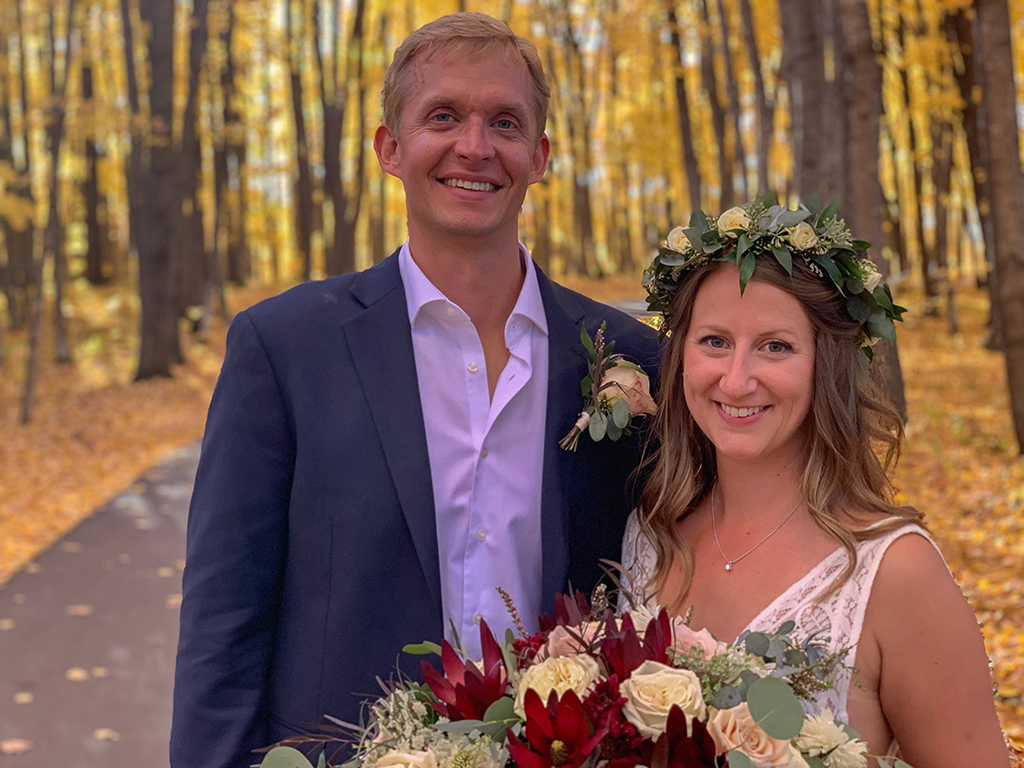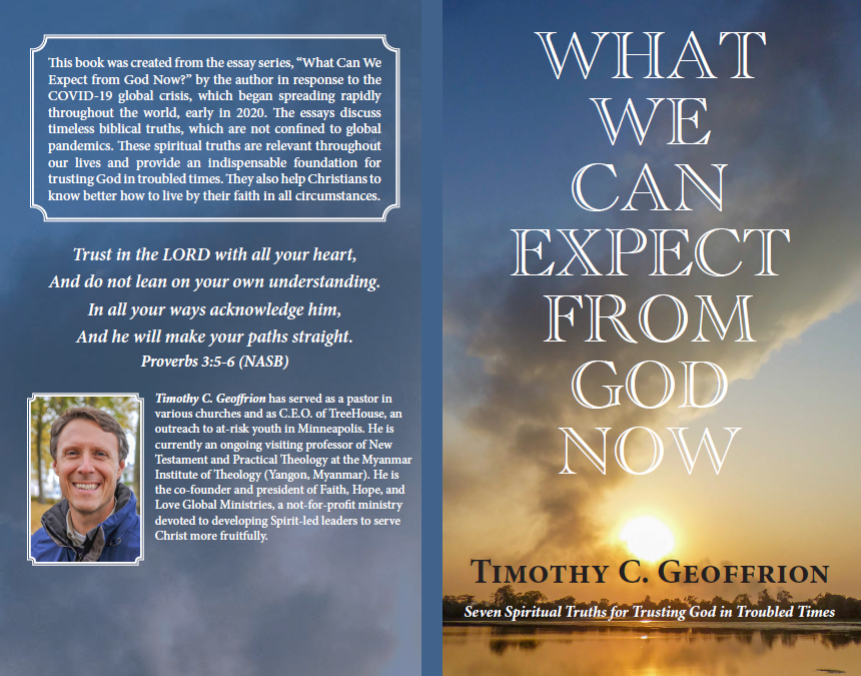On October 10, 2020, I had the privilege of preaching at the marriage ceremony of the son of close family friends and his fiancée, both of whom I have come to know and love over the past several years. The following Charge to the Couple was edited both to protect their privacy and to make it applicable to anyone who wants more love and grace in their marriage.

The marriage day is one of the most important days of your life. It’s a day of celebration. It’s a day of commitment. And it’s a day of testimony to your love and intention to spend the rest of your lives together as husband and wife.
And yet, today is obviously not the beginning of your love and relationship. Today is a highpoint to be sure, but it is just one day, albeit one very special day, in a long flow that began when you first fell in love. So, for a few minutes, I’m going to talk about what you’ve been creating and what’s going to help you successfully continue on this path of mutual love and commitment, which we call marriage.
Live in love
To begin, it’s worth stating the obvious that we’re here today because of love. But, what’s not so obvious to everyone is that there are several different kinds of love, each of which has an important purpose in our relationships, and especially in marriage. C.S. Lewis famously wrote about each one in his book, The Four Loves. To make your marriage strong and enduring, commit yourselves to living in love and by love.
First of all, there is family love. This kind of love isn’t exactly the same for everyone, given that each of us has unique experiences growing up. For many it’s that special bond and affection that they feel for their family of origin. But for others, especially those who have had a painful childhood or been alienated from family members, family love may be felt for a group of people they have identified as their family members, whether they are actually related to them or not. No matter how we may define it, “family” is really important for most of us, because family love, at its best, is what gives us an emotional place of belonging, a place where we can experience unconditional love, and a place we can always return to in order to find people who accept us and want to be with us. What you’re doing today is creating a new family, and inheriting new, extended family members. Don’t take this love for granted. Commit yourself now to doing the hard work to nurture and develop family love as deeply and broadly as possible.
There is also the love between close friends. This kind of love enables you to be each other’s best friend—not only on date nights, but on Monday mornings when you don’t feel like going back to work, on Wednesday evenings when you’re having a hard time getting through the week, and on those long, cold days when there’s nothing to do and all you have is each other. No matter what you might have to face in the years to come, hold on to each other as best friends, and keep cultivating your friendship with one another at deeper and deeper levels.
Then, for a married couple, there is the love of mutual attraction, or what the ancient Greeks called, eros. This kind of love is God’s way of binding a man and a woman together in a unique way, creating a bond that is intended to last for a lifetime within the context of marriage. Celebrate it, thoroughly enjoy it, and carefully protect it. Reserve this level of intimacy for each other and no one else; and enjoy the special closeness that comes from it.
And then, finally, there is agape love. This is the kind of love that the Apostle Paul writes about in 1 Corinthians 13. Agape love is “patient and kind. It always protects, always trusts, always hopes, always perseveres.” In other words, agape love goes beyond constantly changing moods and feelings, and expresses a commitment to do what is in the best interest of the other person, even when it requires personal sacrifice.
This is the kind of love God shows us, and the kind of love he wants us to show toward one another, regardless of attraction, friendship or family relations. It’s the kind of love that led Jesus to sacrifice his own comfort and personal agenda to stand up for others, and ultimately to give his life to demonstrate the unimaginable extent of God’s love.
One of my favorite stories in the Gospels actually started out on a sad note. Jesus’ cousin and close friend, John the Baptist, had just been killed. Jesus, shocked and heart-broken, gathered his disciples together to get away by themselves for a little while. They got in a boat and intended to get some rest and time alone, away from the demands of ministry, at their “lake home.” However, we read in Matthew (14:13-14) that when Jesus got to the other side of the lake, a crowd was already there, looking for him. When he saw them, he had compassion on them, because, in his perception, they were like sheep without a shepherd. So, he gave up his vacation plans and began to heal and teach them many things.
In marriage, there are going to be those times when your spouse is going to need something from you that you’d rather not give. Maybe you just sat down in your favorite chair with a book or turned on the TV to watch a show or game. Maybe you’re tired and just want some time to yourself. Maybe your annoyed or have lost patience. But you’re going to have to make a decision. Will you stop what you’re doing, or give up whatever you’d rather be doing, in order to care for your spouse? The degree to which you make these hard, self-sacrificial decisions will greatly determine how much love there will be in your marriage.
I know this is the kind of love you want to have in your marriage and in your family. It’s a noble ideal; but to live it out you’re going to need to help. And that leads us to the subject of God’s love and grace.
Be filled with grace
Your ability to be loving toward others is directly linked to your experience of being loved, especially by God. When you experience the kind of gracious love that God offers—unconditional, generous love, without strings attached—you develop your capacity to be loving and gracious toward others.
God lavishes his love on us not because of our worthiness, but because of who he is. It’s how he wants to relate to his creation. He wants to love us, and he has within himself the unlimited capacity to be gracious and kind, even when we are at our worst.
We read in Romans chapter two, that God’s kindness is intended to lead us to repentance. In other words, God often chooses to be patient, kind, and merciful toward us, not because he’s soft or doesn’t care, but because he knows that mercy is more powerful than judgment. He knows that the real goal: changing our hearts, producing lasting change, and cultivating love for him will rarely come from harsh judgment and punishment. Changes in the heart come from experiencing agape love, mercy and grace.
In marriage, if you want, you can judge and punish one another when the other person fails you. You have a right to do so. But it’s not the better way. And it won’t make the other person love you more. It simply can’t produce the heart change and the love you truly long for from one another. Kindness, mercy, and grace is what your partner needs when they are trying to get back on their feet and have no right to ask for anything from you.
In other words, grace recognizes that none of us is perfect, and never will be; yet there remains value and preciousness in each of us. Grace chooses to focus on the good, rather than on what’s wrong. Grace accepts the other person as they are, and it forgives when necessary. Grace believes in the other person, even when he or she cannot believe in him- or herself.
Put Christ at the center
When Jill and I got married 38 years ago, we had no idea what we were getting into! We loved each other very much and had become each other’s best friend, but there was so much we didn’t know about ourselves, let alone the other person. We had so much growing up still to do. Sometimes, in our immaturity, frustration, and disappointment, we hurt each other, and said or did things we now regret.
Yet, God’s love and grace gave us the ability to forgive each other when need be. And our common commitment to Christ helped us to rise above ourselves to find direction and purpose that was bigger than our own self-centered instincts. We haven’t been perfect in following Christ by any means, but our relationship with him has been an anchor when we’ve needed stability; it’s been a lighthouse, when we’ve needed to avoid danger in the darkness; he’s been our North star, when we’ve needed to reorient ourselves and figure out which direction to go. And he’s been our common root, which nourishes, renews, and empowers us from day to day. In other words, Christ is at the center of our relationship and we depend on him to lead and guide and empower our marriage.
To use the well-known metaphor of the cross, we have been seeking to cultivate both the vertical and horizontal dimensions of our relationship with God. The vertical dimension represents our personal relationship with God. It’s grounded in God’s love for us and in Jesus’ sacrificial act of love in dying for us. We respond by putting our trust in God’s grace and mercy and by accepting Jesus Christ as our Savior and Lord. Then, in the horizontal dimension, we express our faith in Christ by extending God’s love and grace toward others. This Christ-centered, multi-dimensional spirituality is God’s will for our lives.
So, on this wedding day, fill your relationship with every kind of love, but especially agape love. Put Christ at the center of your marriage and family, and learn how to draw more and more on Christ’s Spirit so that you can offer God’s agape love and grace freely and generously to each other and to others around you.
If you will do these things, you’re going to make it. But far more than just make it, alongside all the mundane and difficult moments, your life together will flourish. It will be full of joy, meaning, and purpose in more ways than you can even imagine now. It will never be perfect, but there will be love, and there will be grace. May this be your marriage story now and for the rest of your lives. Amen.
Copyright © 2020 Timothy C. Geoffrion, Wayzata, Minnesota. All rights reserved to the author, but readers may freely download, print, forward, or distribute to others, providing that this copyright notice is included.
Photo Credits:
- Couple on their wedding day & Northern Minnesota- Timothy Clarence Geoffrion
- Jill & Tim- Timothy Charles Geoffrion (thiswalkinglife.com)
To learn about my most recent book, What We Can Expect from God Now: Seven Spiritual Truths for Trusting God in Troubled Times, you can read samples, see reviews, and order exclusively on Amazon. This full color, devotional book, filled with beautiful photos from France and US National Parks, was written specifically to encourage Christians during this COVID-19 pandemic.















